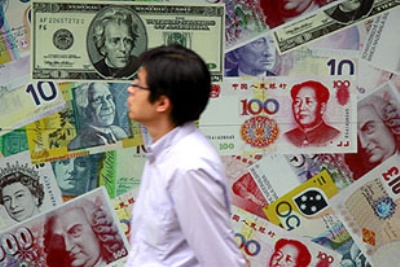
China has revised the exchange rate for the yuan, putting its currency at its highest level yet as international pressure builds on Beijing to allow the yuan to strengthen.
On Friday the Bank of China set the central parity rate, or the daily official level, at 6.7896 to the dollar, 0.3 per cent stronger than Thursday's 6.8100.
The rate is a weighted average of prices given by market makers, excluding highest and lowest offers.
It marks the yuan's strongest level since China freed its currency from an 11-year-old peg in July 2005 and moved to a tightly managed floating exchange rate.
On Friday the yuan weakened slightly in early trading to 6.7900 on China's main foreign exchange market.
In a vaguely-worded statement, the central bank said the yuan would remain "basically stable".
China has tweaked the rate up and down this week ahead of the G20 summit and has a history of letting the yuan strengthen slightly before sensitive events, seen as an attempt to defuse criticism that it keeps the currency too low, giving Chinese exports an unfair advantage
Friday's move is widely seen as a bid to head off rancour at the upcoming G20 meeting in Canada following intense pressure on Beijing to embrace currency reform as part of efforts to enhance a global economic recovery.
Some experts say the yuan is undervalued against the dollar by up to 40 per cent.
Barack Obama, the US president, said on Thursday it was too early to determine the impact of China's limited currency reform although he viewed the move as "positive".
Speaking ahead of his meeting on Saturday with Hu Jintao, the Chinese president, on the sidelines of the G20 summit, Obama maintained that the "undervalued" yuan provided China "with an unfair trade advantage".
For the past two years China had effectively pegged the yuan at about 6.8 to the dollar to prop up exporters during the global financial crisis.
The value of the yuan has long been a source of tension between China and its major trading partners, particularly the US and EU.
Critics say the policy gives Chinese producers an unfair advantage and prices competitors out of the market.
US legislators, unmoved by Beijing's action, have threatened to press ahead with legislation they said will treat "currency manipulation" as an illegal subsidy and enable US authorities to impose tariffs on Chinese goods.
China however repeated a warning on Thursday against "protectionist" retaliation over its currency policy, saying an appreciation in the yuan would not solve the Chinese trade surplus with the United States.
Brian Jackson, a senior analyst at Royal Bank of Canada in Hong Kong, said the yuan's limited moves this week might be enough to deflect criticism at the G20.


